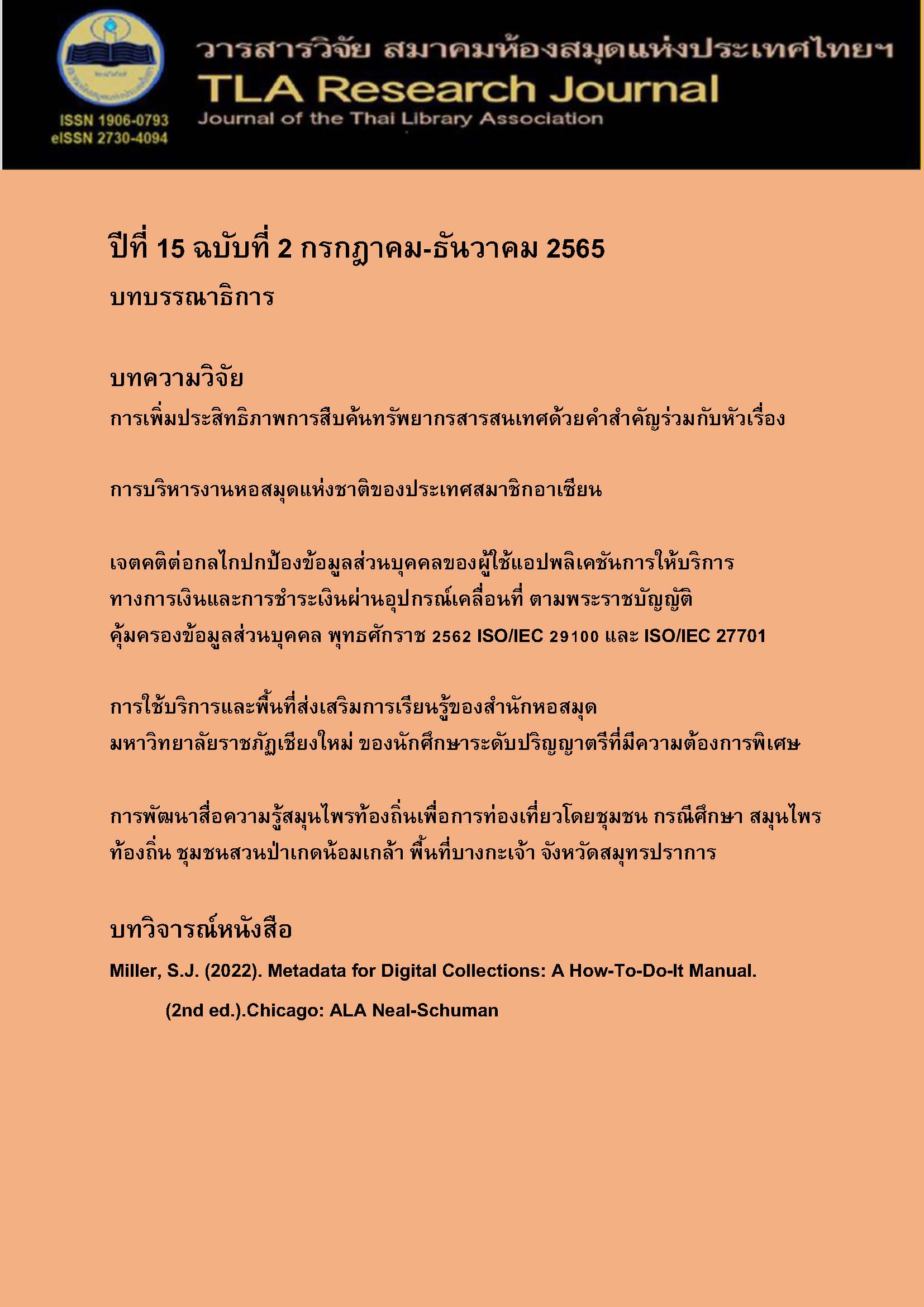Enhancing Information Search Results Using Both Keywords & Subject Headings
Main Article Content
Abstract
This research aims to investigate the importance associated with the use of both keywords and subject headings when searching library resources for information, using a Qualitative Research method For the purposes of this study, content- and document analysis tools were used to collect data and compile data analysis forms. The research results revealed that keywords and subject headings are indeed important when searching library resources for information. However, most users tend to only use keywords in their searches. Despite the high number of search results, there are rather fewer items that match the user's needs due to the absence of subject headings. An experimental study was conducted to investigate whether the use of both keywords and subject headings would enhance the quality of search results. In the process, the Word2Vec model was used to generate embedded words to find subject headings that were similar to respective keywords. The results of the measurement for the efficiency of search results by ranking found that the results produced from using both keywords and subject headings, with the help of Word2Vec model, were more efficient than keyword-based searches alone. This outcome can be used as a guideline for developing an automated information search system that incorporates both keywords and subject headings, which could generate higher accuracy of search results that users often demand.
Article Details

This work is licensed under a Creative Commons Attribution-NonCommercial-NoDerivatives 4.0 International License.
บทความทุกเรื่องที่ลงตีพิมพ์จะได้รับการตรวจอ่านโดยผู้ทรงคุณวุฒิ ความคิดเห็นและบทความที่ปรากฏในวารสารนี้ เป็นของผู้เขียนซึ่งมิใช่เป็นความคิดเห็นของคณะผู้จัดทำ และมิใช่ความรับผิดชอบของสมาคมห้องสมุดแห่งประเทศไทยฯ การนำบทความในวารสารนี้ไปตีพิมพ์ซ้ำต้องได้รับอนุญาตจากคณะผู้จัดทำ
All articles submitted for publication will be reviewed by the academic reviewers. The editorial board and TLA claim no responsibility for the content or opinions expressed by the authors of individual articles or columns in this journal. Reprinting of any articles in this journal must be permitted by the editorial board.
References
Aklouche, B., Bounhas, I., & Slimani, Y. (2018). Query Expansion Based on NLP and Word Embeddings (pp.1-7). The 27th Text REtrieval Conference (TREC 2018). Gaithersburg, Maryland, USA.
Baeza-Yates, R. & Ribeiro-Neto, B. (2011). Modern information retrieval the concepts and technology behind search (2nd ed.). Harlow: Pearson.
Buettcher, S., Clarke, C.L.A. & Cormack, G.V. (2010). Information retrieval: implementing and evaluation search engines. Cambridge: MIT Press.
Cabanac, G, et al., (2016). Joint workshop on bibliometric-enhanced information retrieval and natural language processing for digital libraries (BIRNDL 2016)(pp.299-300). 2016 IEEE/ACM JointConference on Digital Libraries (JCDL).
Cheysiri, P. (2000). Student Usage of Online Public Access Catalog Service : A Study at Ramkhamhaeng University (Master’s thesis). Ramkhamhaeng University, Thailand. [In Thai]
Halder, S. N. (2021). Empirical Study on Subject-Based Information Retrieval with Special
Reference to Bengali Documents. Journal of Library and Information Science, 15(2), 130-139.
Han, J., Kamber, M., & Pei, J. (2012). Data Mining: Concepts and Techniques. Amsterdam: Morgan Kautmann.
Informatic Innovation Center of Excellence. Walailak University. (2019). OPAC&Utility. Retrieved from https://www.lib.buu.ac.th/KM/wp-content/uploads/2020/06/User-Doc-OPAC-Manual-Ultimate-1-May-2019.pdf [In Thai]
[Information Technology for Works] เทคโนโลยีสารสนเทศเพื่อการจัดการอาชีพ. (2017). Retrieved from http://avangerthefor.blogspot.com/2017/06/33.html [In Thai]
Intraprapan, C. (2014). Optimization of Information Retrieval Using ThaiWordNet. Retrieved from https://research.kpru.ac.th/sac/fileconference/7672018-05-11.pdf [In Thai]
Intraprapan, C. & Kesorn, K. (2014). Ontology-based Technique for Cross-Language (Thai-English) Information Retrieval. Information Technology Journal, 10(1), 21-30. [In Thai]
Jutopama, S. (2007). Using Service on Information Retrieval Through OPAC System of Burirum Rajabhat University Students. Retrieved from http://dspace.bru.ac.th/xmlui/bitstream/handle/123456789/3284/2549-research-Siranee.J.pdf?sequence=2&isAllowed=y [In Thai]
Kruaysawat, N. (2016). Integating folksonomy concept in building subject heading for information resources in the fields of Business administration and economics. (Doctoral dissertation). Khon Kaen University, Thailand. [In Thai]
Kruaysawat, N., Manmart, L., & Kabmala, M. (2018). Users’s Behavior In Accessing and Using Key Words to Retrive Business and Economic Information. Journal of Information Science, 36(1), 69–108. [In Thai]
Lertmahakiat, W. & Mingkwan, A. (2010). The Innovation of Multiple Relations Information Retrieval. The Journal of KMUTNB, 20(3), 514-523. [In Thai]
Mikolov, T., Corrado, G., Chen, K., & Dean, J. (2013). Efficient Estimation of Word Representations in Vector Space (pp.1-12). Proceedings of the International Conference on Learning Representations.
Nimsomboon, N. (2018). การกำหนดคำสำคัญ [Using keyword]. Retrieved from http://203.131.219.167/km2559/2018/06/12/การกำหนดคำสำคัญ-keyword/ [In Thai]
Ouantrai, S. (2008). The Use of Web Online Public Access Catalog of Undergraduate Students, Khon Kaen University (Master’s thesis). Khon Kaen University, Thailand. [In Thai]
Panommit, P., Arayaphan, W., & Julrode, P. (2017). Retrieving and Accessing to the Knowledge of Lanna Textiles from Information Resources in the Upper Northern Thailand. Veridian E-Journal, Silapakorn, 10(3), 1545-1559. [In Thai]
Shera, J.H. & Egan, M. E. (1956). The classified catalog : basic principles and practices. Chicago: American Library Association.
Sriwantan, P. & Arayaphan, W. (2022). Storage and Retrieval of Lanna Information Resources at the Institutes of Information Services in the Upper North of Thailand. Journal of LiberalArts Maejo University,10(1), 42-66. [In Thai]
TaKham, T., Kabmala, M., & Manmart, L. (2016). Scholar and Researchers’ Behavior in Retrieving. Journal of Information Science, 34(1), 54-93. [In Thai]
Yu, W. & Chen, J.(2020). Enriching the library subject headings with folksonomy. The Electronic Library, 38(2), 297-315.


